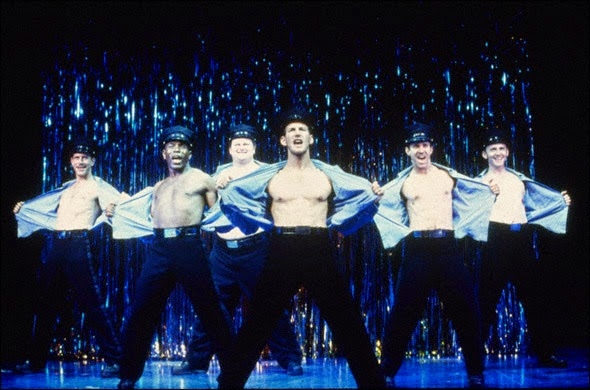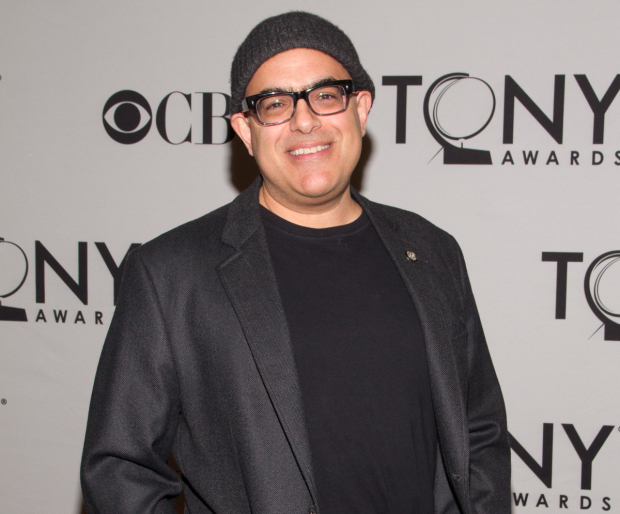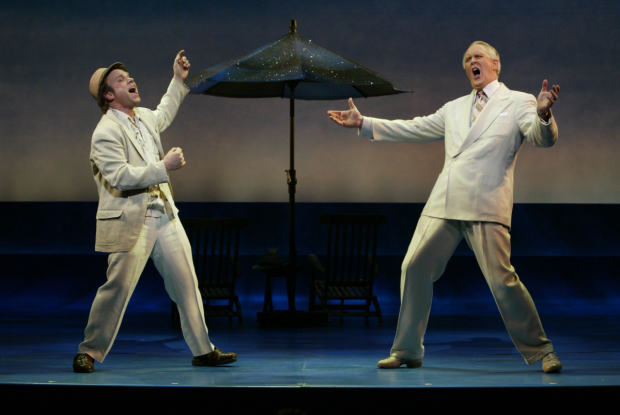Making Music With David Yazbek, Songwriter of The Full Monty and Women on the Verge

(© Craig Schwartz)
When you've written musicals like The Full Monty, Dirty Rotten Scoundrels, and Women on the Verge of a Nervous Breakdown, you've earned the title "fan favorite." That moniker is fitting for David Yazbek, the composer-lyricist who won a Drama Desk Award for Monty and earned Tony nominations for all three shows. Yet Yazbek is more than just a theatrical tunesmith.
In his estimation, Yazbek has penned "hundreds of songs," including, perhaps most notably, the classic theme for the television series "Where in the World Is Carmen San Diego?" It's this motley arrangement of pop, rock, and jazzy showtunes that best describes Yazbek's oeuvre, which he'll put on display in his debut cabaret show at Feinstein's/54 Below on May 4.
When you've written that much, how do you decide what to perform? And when one of your musicals abruptly closes on Broadway, how do you gather the courage to pick up and rewrite it for future productions? Yazbek offers his words of wisdom on some "great big stuff."

(© Tristan Fuge)
You frequently perform live with your group Yazbek and Band. Is there a science to the way you come up with a set list?
Part of the science is just sitting at a piano playing stuff and deciding whether I feel like singing it. I love playing with great musicians. These are the best musicians in New York. Everyone has either played in my pits or played with me or are people I know. A lot of it is me deciding what I want to listen to them play. I love reminding myself that I am as good a musician as a player. It's like playing tennis with great tennis players. I'm playing with them and I also get to watch their masterful art.
Do you differentiate between "David Yazbek, the player" and "David Yazbek, the songwriter?"
It's not separate for me. I'm lucky, I've always written and played. I took lessons in a couple of instruments. I only took piano lessons very briefly. I feel like had I concentrated on the technicalities of being a piano player, I probably would have been a really good one, but I probably would not be the writer that I am.
Why is that?
The first arranger I ever worked with was Harold Wheeler, and he's a brilliant musician. He was watching me play the piano when we were working on The Full Monty. I said, "I'm frustrated. I wish I could sight read, I wish I had more of those classical chops," and he said a lot of guys who are great arrangers, even great orchestrators and conductors, are not really great composers because [they know] all the rules and it keeps them from free flowing with their writing. I took that to heart. The best position to be in is to somehow have all of that, like Adam Guettel. He's got really good technique and he can play, with some practice, anything. He's also a great composer who can fly any way he wants to. But that's the exception.
Last year you had two of your shows, Dirty Rotten Scoundrels and Women on the Verge of a Nervous Breakdown, running simultaneously on the West End. How big of a thrill was that for you?
That was fun. There was this one two-week period in Belsize Park in this town hall where you can rehearse a show, and on the second floor, we were doing a workshop of Women on the Verge, and on the third floor, we were in rehearsals for Dirty Rotten Scoundrels. I was running up and down from workshop to rehearsal — two different directors, two different shows. It was very exciting.
Women on the Verge underwent a lot of changes from the Broadway run in 2010 to the West End production in 2015. What did you and your book writer, Jeffrey Lane, learn about the show in the intervening years?
We learned a lot. Here's the timeline: We wrote the show and were asking to go out of town. Lincoln Center said, "Let's do workshops instead," and Jeffrey and I, who don't like travel, said OK instead of using our heads. I'm not blaming it on that alone, but we didn't have the chance to see what the show was and what it wasn't.
It turns out what the show isn't is a giant spectacle with lots of treadmills. The production should not be this big cinematic extravaganza. The story and characters are so interesting that that's what you need to highlight. We kept working on it, which you never do. We worked on it, it was better, but it still wasn't the show it could be [on Broadway].
When Music Theater International was going to license it, we sat down to really look at it and figure out how to make a show that anybody can do, and will be understandable. And then fast-forward a year and a London producer wanted to do it, and we dug in again. We figured out what the story is. We have a show now that's a great show. The UK cast album is even better than the American cast album. It's very rhythmic. [Film director Pedro] Almodóvar thought it was great. It was a great experience.
Would you like to see it back here in New York?
I would love it if someone had the balls to do a revival off-Broadway or something. The best thing would be able to somehow bring that exact [West End] production over here.
What can you tell us about your next show, The Band's Visit, at Atlantic Theater Company?
We had a reading that made me very happy about it. I like what I'm doing with the score. It's pretty eclectic; there's a lot of Arabic influence. I think it's a very different kind of musical. Now we're working with David Cromer, who's pretty remarkable. The guy's really got the goods. But man, it's just really interesting when you're doing a show like that, and you're casting your net for musicians. I get to listen to and then play with these great oud players. I'm learning how to play the doumbek. It's not like all the songs sound like they come right out of Egypt, but you delve into the music and let it flavor what you do.

(© Carol Rosegg)











